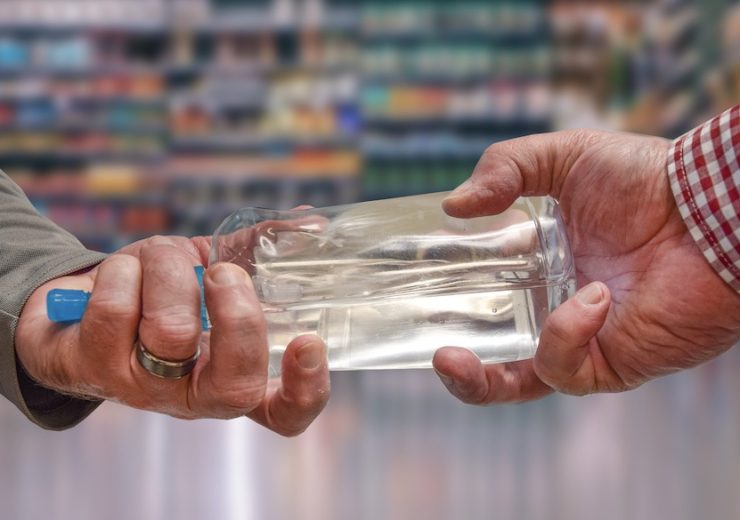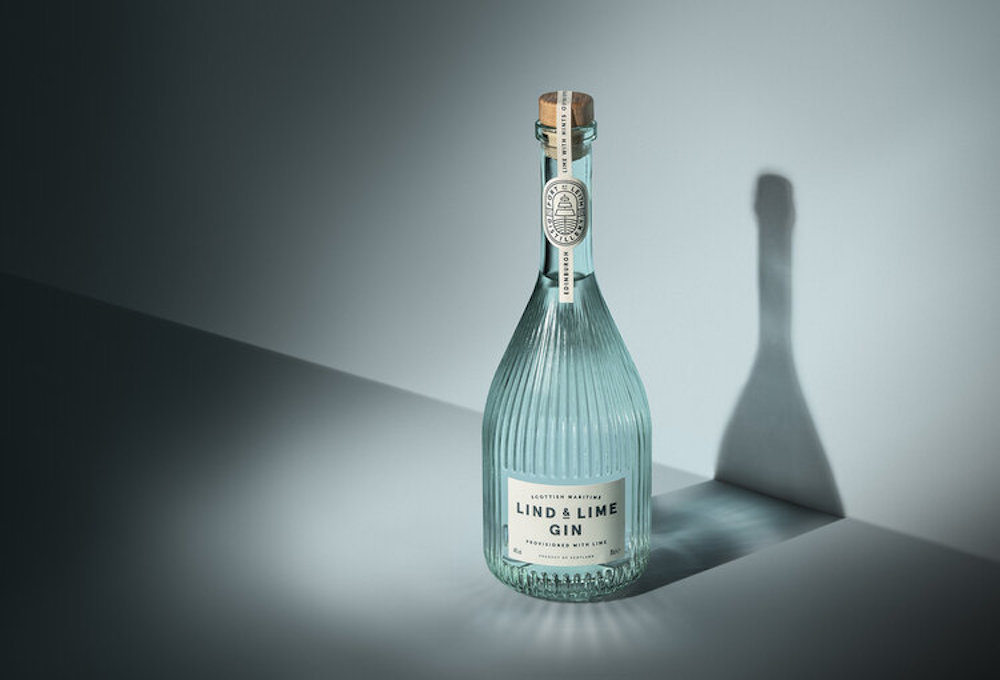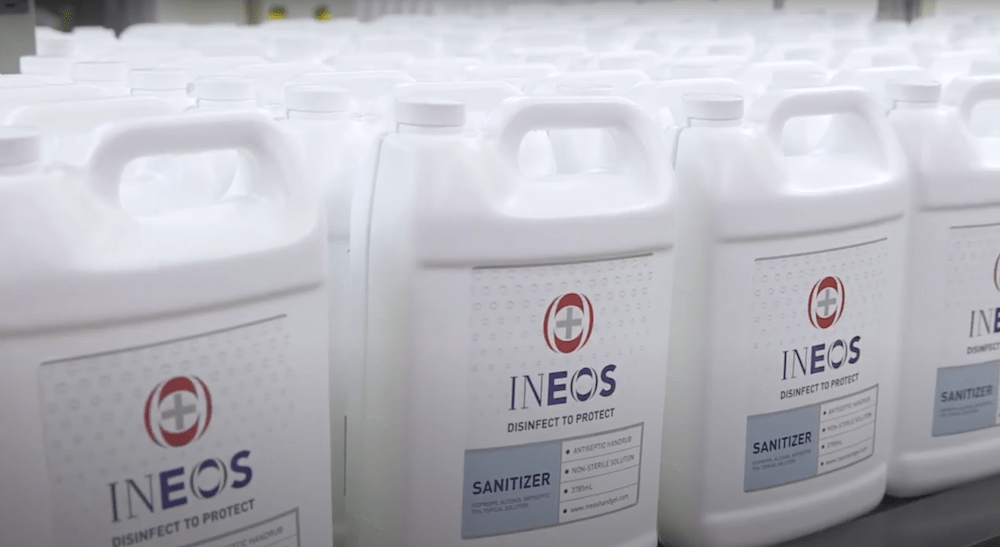Chemicals company Ineos is one business that sees its future in the hand sanitiser market, and it will play a key part of its planned Ineos Hygienics subsidiary

The first notable increase in hand sanitiser sales occurred during the 2009-10 Swine Flu outbreak (Credit: Pixabay)
Covid-19 has created a desperate need for many products — key among them is hand sanitiser, a market where huge growth is forecast in the coming years. Thomas Parker explores what place it will have in a more hygiene-conscious future.
The year is 2025 and the daily Tube commute is in full swing. Inside commuters’ handbags, satchels and pockets are essentials for the day ahead — mobile phones, keys, wallets… and hand sanitiser.
Before the Covid-19 outbreak, this may have seemed a far-fetched concept for even the most optimistic manufacturer of the product — but the silent and lethal danger posed by the virus has heightened awareness of personal hygiene to unprecedented levels.
In February, UK-based online pharmacy Medino said the number of people buying hand sanitiser had risen by more than 1,000% when compared to the period between November 2019 and January this year.
Its competitor UK Meds didn’t sell the product before the pandemic, but has now sold 40,000 bottles since the beginning of March.
Its medical director, Shyam Morjaria, puts the figures down to an increase in “hygiene conscience” among the public.
And looking at previous pandemics and epidemics, he believes there has been a trend in more “proactive” responses to public hygiene in everyday life.
The Black Death, which killed up to 200 million people in the 14th century, led to local governments taking more rigorous control of street cleaning, disposal of corpses and water maintenance — while the 1918-19 Spanish flu changed male attitudes towards personal cleanliness.
Morjaria believes the Covid-19 pandemic will have a similar impact by “re-emphasising the need for good hygiene control”.
He adds: “Historically speaking, previous pandemics have always given rise to the way people view their personal hygiene.
“People have continued habits such as regularly washing and sanitising their hands.
“Those who have perhaps taken their personal hygiene for granted aren’t anymore during this pandemic, and I hope this continues in the same vein.”
Market forecasts appear to reflect the importance of hand sanitiser within this new age of hygiene-consciousness.
Analytics company Reportlinker said the European market was worth $641m in 2018 but predicts it will grow at a compound annual growth rate of 38.4% between 2019 and 2027 to reach $9.4bn.
Why is hand sanitiser important during the coronavirus pandemic?
The alcohol-based hand gel is regarded as an alternative to someone washing their hands with warm water and soap — which, according to the World Health Organisation (WHO), is one of the most effective ways to limit transmission of Covid-19.
Good hand hygiene is particularly important due to the virus’ “effective reproduction number”, or R rate.
A way of measuring an infectious disease’s capacity to spread, Covid-19’s global mean R rate is estimated by statistics company Statista to be between 1.5 to 3.5 — meaning one person could infect more than three people.
To limit the spread of the virus, more than 90 countries have instigated some form of lockdown since the outbreak.
This has left many feeling anxious about coming into contact with individuals from outside their immediate household.
According to a survey by Ipsos Mori, more than 60% of people in the UK would be uncomfortable returning to bars and restaurants after restrictions are eased, with more than 30% saying they would remain reluctant to visit shops or send children to school.
The scientific consensus is that it won’t be safe for life to return to normality until a vaccine becomes available. Hopes are high for an Oxford University-developed product to be ready by September, although many have dismissed this as overly optimistic.
But even in such a best-case scenario, where the vast majority of people have immunity from Covid-19, some psychologists believe anxiety will continue to make hygiene a priority.

Lusia Stopa, a psychology professor at the University of Southampton, says: “When we start to come out the other end of all this, I think there’s going to be anxiety for some people about whether or not it’s the right time to come out of lockdown.
“We’re going to have a situation where we have the gradual easing of lockdowns, with the possibility of going back into lockdown if cases rise.
“So there’s going to be a lot of people faced with questions like, ‘if my child goes back to school, is he or she going to get it? Is it really safe to be out there?’
“I would anticipate quite a significant rise in stress and anxiety, and some of that could endure beyond this pandemic.”
Such a phobia is caused when, according to Prof Stopa, there’s a “massive overestimation of threat”.
To relieve stress and anxiety, some people — including those with obsessive-compulsive disorder (OCD) — go through “decontamination rituals” such as repeatedly washing their hands with warm water and soap or hand sanitiser.
Perhaps hand sanitiser could become the modern-day equivalent of the pocket square handkerchief popularised by male actors in Hollywood’s Golden Age, which encouraged many men to carry one throughout the 20th century.
Hand sanitiser has origins stretching back to the 1940s, but wasn’t widely available beyond hospitals and highly-sterilised workplaces until the early 2000s.
The first notable increase in sales occurred during the 2009-10 swine flu outbreak, which, like Covid-19, could be transmitted between humans through coughing, sneezing and touching surfaces.
Market researcher Nielsen reports that, in the 24 weeks leading up to 3 October 2009, sales increased by 71% to $118.4m in the US, compared with the $69.4m in the same period a year earlier.
Demand has again risen in 2020, with US sales in March experiencing a 470% jump compared with the same week a year earlier.
But huge demand — stimulated by WHO guidance for everyone to use it, which would require 385 million litres of the gel being available at any one time — led to global shortages.
This means companies with the ability to manufacture or stock the product — ranging from alcohol brands and consumer goods multinationals to petrochemicals giants and online pharmacies — have made it a core part of their short-term business strategy.
Many now, though, are wondering whether it should form part of their longer-term plans given the expected prominence of hand sanitiser in a post-lockdown world.
What is hand sanitiser’s future in non-traditional industries?
For nearly two centuries, Nottingham and the healthcare industry have gone hand-in-hand, proudly boasting itself as the birthplace of the UK’s largest pharmacy chain Boots, painkiller ibuprofen, and the MRI scanner.
The city, which has built a thriving biosciences community off the back of this heritage, is also home to UK Meds.
Founded by Joe and Mason Soza in 2016, the firm has grown into one of Britain’s largest online pharmacies — serving more than 200,000 patients with prescription medication.
During the Covid-19 pandemic, it has also pivoted to vital medical equipment such as face masks and hand sanitiser — with 12,000 sold in the first month of stocking the product in March and another 20,000 in April.
Buyers have been both businesses and individuals.

Morjaria explains: “When the Covid-19 lockdown happened and there was more awareness surrounding hygiene protocols, we were receiving an increased number of requests through our customer service department for hand sanitiser.
“People have realised there’s probably somebody in their family who falls in the moderate- to high-risk categories.
“While that may not have been the case before, I believe the public have become more hygiene-conscious now, and I think it’s definitely here to stay.
“The way we look at it as a company is Covid-19 has been an education for people on the importance of cleanliness.
“This is especially the case in terms of how to minimise the spread of infection and maintain optimal health — not just for oneself, but for loved ones.”
Does the alcohol industry have a long-term future in the hand sanitiser market?
Playing home to a shopping mall, restaurants and, most notably, the Royal Yacht Britannia, the waterfront next to the Port of Leith has been a popular tourist hub for people visiting Edinburgh for more than 20 years.
Since 2016, the dockyards have also been the main hub for the Port of Leith Distillery.
Traditionally in the gin and sherry-making business — and whisky shortly — the company has turned its resources to producing hand sanitiser instead.
This wasn’t the plan for founder and co-CEO Ian Stirling, who, for the first few months of 2020, was in the US with his business partner raising investments for the company.
He explains: “We came out of that on a real high — sales of our gin were doing really well, we were building our whisky distillery and, after so many years, it was all very exciting.
“Then Covid-19 struck and, with every coming day, things were getting more serious and the market was flat — the world was slightly collapsing around us.”
So the company, which had plenty of high-strength alcohol in its distillery, decided to begin making hand sanitiser — enough for storing between 150 and 200 litres in its Lind & Lime gin bottles each day.
Stirling adds: “What really struck me was the significant need for this.
“It’s one thing to just make it as a gimmick, but when we started getting approached by the police or NHS saying ‘we need this stuff’, we began to look at what we could do.
“The hand sanitiser was also sent to charities that were giving food to the homeless or running hostels — the distillery has even given some to bus drivers.
“The company is still getting requests coming, but I’m relieved to say the demand has fallen now as it does seem people are now able to purchase it from the usual sources.”
Port of Leith Distillery’s shift into hand sanitiser comes as the alcoholic beverages market has been hit by Covid-19 lockdowns — with the enforced closures of pubs, restaurants and hotels creating a big hole in sales that hasn’t been plugged fully by supermarkets.
Analytics firm GlobalData forecasts the spirits market size will drop by 6.9% in 2020, with similar declines predicted for the beer and cider, and wine sectors.
Olly Wehring, editor of drinks industry news website Just-Drinks, explains: “With that on-premise tap being switched off, sales have just fallen through the floor.
“Companies are now abandoning their full-year guidance at the moment because it’s all over the place.
“At the same time, it’s also looking really bad in the medium term, as the premiumisation trend has stopped in the short term with people stockpiling on cheaper drinks.”

The Port of Leith Distillery is just one of a number of smaller manufacturers that are, according to Wehring, using hand sanitiser to keep business “ticking over” by making back some lost revenue.
In March, Aberdeen-based craft beer brewery BrewDog announced it would use its distillery to manufacture “Punk Sanitiser”, which was later distributed to Aberdeen Royal Infirmary’s intensive care unit.
As of 15 April, BrewDog had donated almost 200,000 bottles of its hand sanitiser to NHS hospitals and healthcare charities.
Drinks multinationals have also shifted some of their production capabilities into the hand sanitiser space, with AB InBev, Pernod Ricard and Diageo-owned distilleries making millions of litres of the product.
Post-Covid-19, Wehring believes it’s “not beyond the realms of possibility” big drinks companies will have some involvement in the hand sanitiser marketplace, although he says it’s “highly unlikely” for this to shift their profit needle.
But Buckinghamshire-based spirits business British Honey Company views its alcohol sanitiser — Drip+Drop — as a new long-term revenue generator to help soften the economic shock of the Covid-19 crisis.
The company, which has spent £500,000 ($609,000) in retooling its distillery, said the revenue generated from its new disinfectant line has more than offset the decline from its core product.
Speaking to Just-Drinks in April, CEO Michael Williams said it would be a permanent addition to the company’s portfolio and will benefit from increased hygiene products, even after the pandemic subsides.
He said: “This is a tragedy. It’s like the Second World War — our whole way of life is going to change.
“Alcohol sales have dropped off and sanitiser sales have gone up. Our whole production line is working seven days a week on sanitiser.”
How Ineos is looking to shift into the hygienics marketplace
Until recently, Ineos described itself as the “biggest company you’ve never heard of”. A giant of the oil and gas world, producing 60 million tonnes of petrochemicals per year, it employs 22,000 staff across 183 sites in 26 countries.
Founded by chemical engineer-turned financier Sir Jim Ratcliffe in 1998, it is also Britain’s largest private company, with $60m annual sales for the solvents it manufactures for use in insulin and antibiotics, as well as chlorine to purify drinking water.
Its under-the-radar image is now a thing of the past, after a spate of both positive and negative news coverage — including taking over from Sky as lead sponsor of Britain’s top professional cycling team, but also courting criticism for its stand-off with workers at the Grangemouth crude oil refinery in Scotland.
But Ineos, no stranger to diversifying its business having launched a controversial but ultimately failed bid to begin fracking in the English countryside, has invested heavily in manufacturing hand sanitiser.
In March, the company announced it would build factories in the UK and Germany to produce one million bottles of hand sanitiser a month.
It would supply them to hospitals, schools, places of work, pharmacies and supermarkets.
Speaking at the time, founder, chairman and the UK’s fifth-richest person Ratcliffe said: “It’s becoming increasingly clear that hand-to-mouth infection is a significant cause of Covid-19 contagion and Ineos is Europe’s largest manufacturer of the core ingredient of hand sanitiser.
“We will build two factories in the UK and Germany in 10 days to produce very substantial supplies.”
Since then, the firm has also opened two plants in France, with the members of Team Ineos — featuring Tour De France winners Chris Froome, Geraint Thomas and Egan Bernal — helping to deliver hand sanitiser bottles to hospitals in the country.
Alongside this, the company has built a further two plants in the US states of Arkansas and Pennsylvania — each producing a million bottles per month.
Ineos’ shift to hand sanitiser was a relatively simple one as it’s a leading producer of the raw materials needed for sanitisers — isopropyl alcohol and ethanol.
As it eyes long-term revenue streams beyond petrochemicals, the firm sees its future in the hygienics marketplace and aims to build a new subsidiary called Ineos Hygienics.

The venture will involve it producing and marketing a range of Ineos-branded hygiene products such as hand sanitisers.
At the beginning of April, another manufacturing giant, Unilever, announced it had delivered its first batch of more than 700 litres of hand sanitiser to Leeds’ St James’s University Hospital.
The consumer goods company, which was able to scale-up development from its laboratory trials to factory production in just four days, aims to donate further products to support the city’s NHS trust in the coming weeks.
Similarly, Unilever factories in Australia and New Zealand have been redirected from making deodorant to hand sanitiser to meet demand.
As part of this work, the company has donated 150,000 hand sanitiser cans to food banks based in the two countries.
Unilever Australia and New Zealand CEO Nicky Sparshott previously said: “We believe we have a social, medical and moral obligation to make hand hygiene readily available.
“That’s why we’re responding to government calls to action to increase supply of essential products by rapidly innovating and re-directing some of our Australian manufacturing.”
Outside the multinationals, smaller companies are also doing their bit to make workplaces safer.
Roofing products distributor Permaroof has diversified its product range in response to changing industry needs during the Covid-19 pandemic.
It is now stocking a disinfectant spray, which was developed by Quin Global, manufacturer of adhesive and tool systems, in just three weeks.
Called Ramsol, the disinfectant will be supplied by Permaroof to its customers, most of which are based in construction.
The Derbyshire company’s managing director, Adrian Buttress, who was inspired by another manufacturer that had also retooled to make disinfectant, says it’s important for the firm to play its part during Covid-19.
He adds: “The first use for it was by making sure our own premises were free from this virus.
“And then it was a case of doing whatever we could to keep our customers safe and back ready to open the doors again to their businesses.
“We sold a few thousand cans of this product to stockists that were using it to get a sanitiser offer to their customers ready for when they opened up.
“It’s really important we cater for our customers’ needs. Every employee, every company vehicle and every desk, chair and door handle can be sprayed with our product.
“We need to keep this going so it becomes a habit for people to be sanitising as we go.”
In its most recent guidance, the UK government said businesses involved in the construction industry must provide handwashing facilities or hand sanitisers for their employees coming into and leaving work, as well as in meeting rooms.
Alongside this, it advises firms to encourage more handwashing for workers handling goods and merchandise, providing them with hand sanitiser where this is not practical.
Buttress, who hopes his company is still providing businesses with spray sanitiser in the longer term, believes the industry will have learned lessons from the pandemic.
He adds: “In a few months’ time, it will have become second nature to sanitise our hands.
“Whenever you’re in a hospital and you walk by a hand sanitiser, you always tend to use it as we know the importance of keeping the hospitals germ-free.
“I think we will take this a step further and get into a habit of doing this outside of hospitals, and so we should.”
Hand sanitiser can play a key role in preventing the spread of Covid-19, as well as any future diseases, and some of the new entrants to the market have spotted an opportunity that extends beyond this pandemic.
For UK Meds’ Morjaria, it could even help prevent huge disruption during the next major outbreak.
He adds: “Looking at it on a grander scale, if there’s good hygiene protocols in place, then it will vastly improve infection control both locally and globally.
“Hand sanitiser definitely has a big place in this new world we’re entering.”


